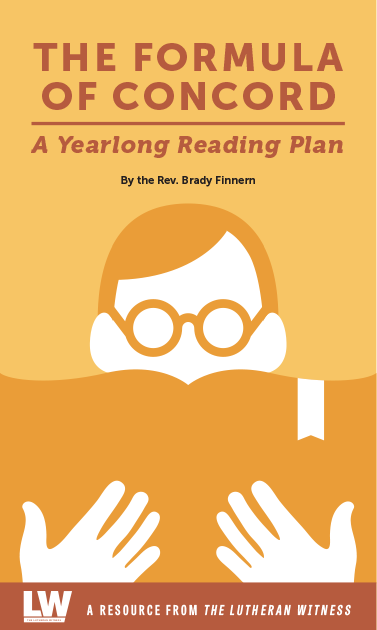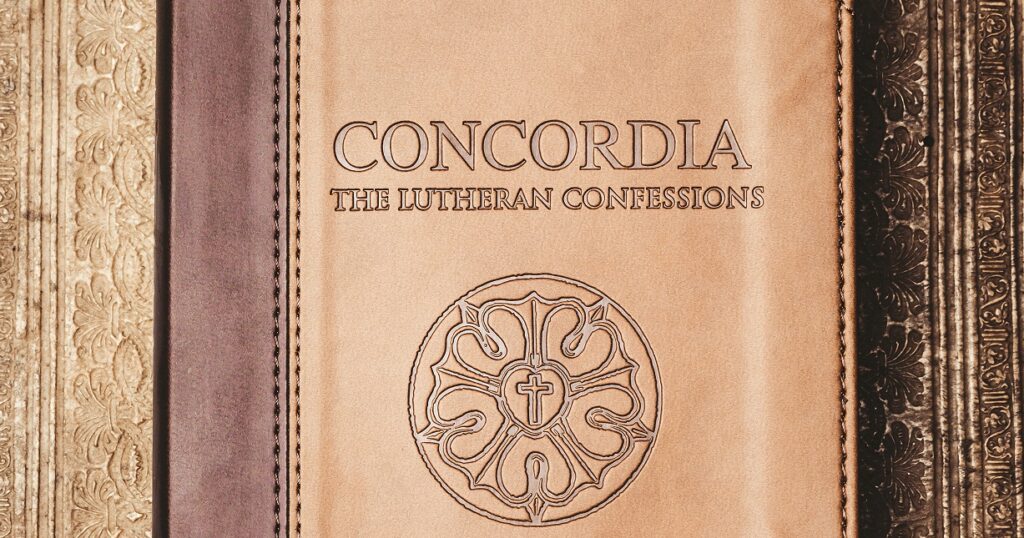
Throughout 2025, The Lutheran Witness printed a monthly reading plan that walked through the 12 topics of the Formula of Concord — original sin, free will, good works, Law and Gospel, the Lord’s Supper, etc. — with just a few pages of reading a month.
Now, we have repackaged this resource as a booklet that you can return to year after year, use with your youth group or classroom, or recommend to friends.
This reading plan, written by the Rev. Brady Finnern, is a simple and low-investment way to dive into our Lutheran Confessions and ponder theological topics that are still crucial today. If you have been meaning to open up The Book of Concord but don’t know where to start, this reading plan is for you!
Full Reading Plan Booklet
Including monthly reflections by Rev. Finnern, which you can download or print.
Reading Plan At-a-Glance
A one-page overview of the readings for the year, which you can hang on your wall, use as a bookmark, or save to your phone for reference.
Note on the readings: There are two parts to the Formula of Concord. We will be primarily reading the Epitome (“Ep”), the first and shorter part. Page numbers refer to the Reader’s Edition of the Book of Concord (CPH 2006), but you can use the section and line numbers to follow along in any edition.






I noted that there will be an intoduction to each month’s set readings in that month’s print edition of the Lutheran Witness. The problem with that is that I don’t get my print edition OF LW in the first week of the month. Can you please include the intro material in the online edition of LW (the one linked to from the monthly LW Newsletter). Thank you for your help.
Good idea, John! I have added the January intro to this document and will continue to add each month’s before that month begins: https://witness.lcms.org/2024/reading-plan/
Is there an index or list of podcasts from Coffee Hour to correspond with the readings. Or will each week of Coffee Hour correspond to the suggested readins?
The pagination suggested for the readings from the Reader’s Edition don’t seem to match up with the actual pages in the volume. Am I missing something?
Hi Bob, what edition of the Book of Concord are you using? These pages track with the 2006 “Concordia: The Lutheran Confessions, A Reader’s Edition of the Book of Concord” from CPH (black cover with maroon spine). If you have a different edition, you can still use this plan: Just turn to the right document in the book (there is a key to the Abbreviations at the bottom of the reading plan) and use the section (Roman numeral) and paragraph numbers to find the right place.
For example, in January Week 1, you see:
Ep “Summary” 1–8 (p. 473–474)
Ep I 1 (p. 474)
Find the Epitome of the Formula of Concord in your Table of Contents, and read the section at the beginning titled “The Summary Content…” and the first paragraph of the section “I. Original Sin.”
Stacey,
Thank you for your response.
When I first read about this reading plan, I jumped right with the Confessions of week 2 for October—the Epitome X 1-2. I turned to page 496 and I see the affirmative statements for II Free Will, numbers 3 through 6 and then the negative statements begin.
What finally dawned on me was that this copy is defective and page 496 and 497 have nothing to do with each other! I hadn’t noticed this before as I typically use the Wengert edition for my reading. I’ll have to get a new copy. My edition is dated “2005” and that may explain the problem.
Oh no!! Sorry to hear that! Yes, it sounds like that one must have gotten fixed in the 2006 reprint.
Do I have to get updated to 2006 I have the original that has the supplimental corrections. Is there a way to transpose the October sheet to work with my edition?
Valerie, the page numbers aren’t strictly necessary. If you follow the abbrevations (Ep = Epitome, etc.), you’ll be able to follow the readings. For example, Week 1 of January is the Summary from the Epitome, paragraph 1 from the first article (Original Sin) and then AC II, which is the second article of the Augsburg Confession.
I have been reading the BoC over the last 20 years. The Treasury of Daily Prayers includes a daily reading as part of the devotions and Rev. Finnern has sent a printable devotional guide the past two years that also included a daily reading from the BoC. I am looking forward to this plan as he will be commenting in each monthly issue of the LW. I always appreciate and look forward to any method of growing in the faith. Thank you Rev. Finnern for putting this together for us. In Christ.
RE: “Lutherans affirm the Book of Concord….”
When I became a communicant member of an LCMS congregation, I affirmed the teachings of Small Catechism but not the entire the entire Book of Concord. I think that my experience is typical.